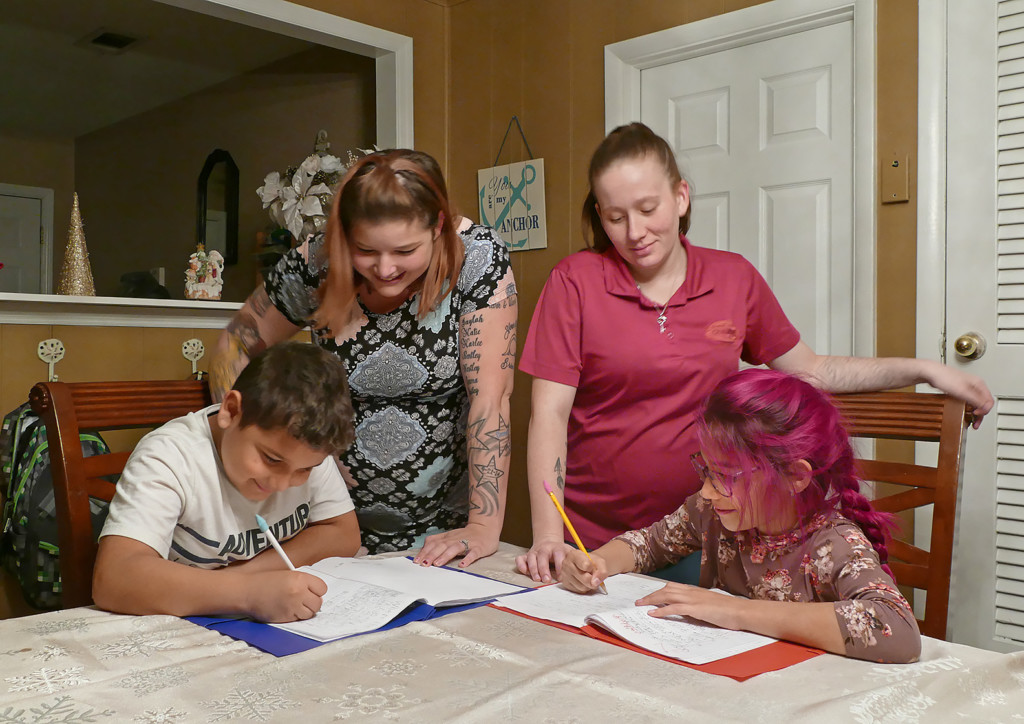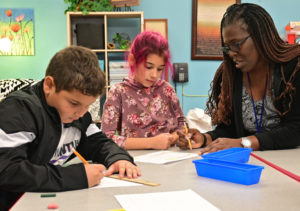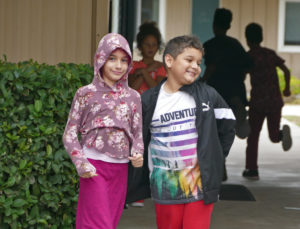
JACKSONVILLE, Fla. – Alicia Davis needed a fresh start after a storm of challenges – including being a teen mom – overwhelmed her in high school. Kaitlin Davis needed a safe place after kids in her assigned middle school tormented her over her sexual identity.
They are adults now, happy, married, and raising a family. For their 9-year-old twins, Brian and Leah, who endured bullying in kindergarten, the Davises turned almost instinctively to the kind of education choice options that are available to parents in one of the most choice-rich states in America. They found a private school, courtesy of a state scholarship, that knew how to navigate their children’s “disabilities” while also understanding their pain.

When you have options, “You don’t have to sacrifice being emotionally okay to have a good education. You don’t have to sacrifice a good education to be emotionally okay,” said Kaitlin, now 23. “You can have both.”
(Watch the video at the end of this post to hear Alicia and Kaitlin tell their story in their own words.)
Kaitlin and Alicia, 25, have been together five years. They married last year. Kaitlin is a collision adviser at a Toyota dealership. Alicia stays at home so she can best care for their 5-year-old, Emmett, who has diabetes. Kaitlin is pregnant with their fourth child. Their cozy house in a working-class neighborhood is 20 minutes from the school they consider a lifeline.
The Davis’s experience with public education is fast becoming the new normal in Florida. A generation ago, about 10 percent of K-12 students in Florida attended something other than assigned district schools. Today it’s more than 40 percent.
“Multiple choice” families with children enrolled in two or more options are not hard to find. It won’t be long before the same is true of families like the Davises.
***
Alicia Davis didn’t do well in district schools. ADHD made her unruly. Medication for it left her sleepy. Other issues piled on. Making friends was a struggle when her family moved from small-town Ohio. So was coming to terms with her sexual orientation. So were family members who didn’t understand.
In 10th grade, Alicia got pregnant. She didn’t listen to those who advised her to end the pregnancy; abortion violated her belief system. She didn’t listen to dark voices in her own head, either. At one point, she said, she stood on a third-floor apartment balcony for 45 minutes before crawling away. “I said, ‘This isn’t how my life should be for my babies,’ ” she said through tears. “So I talked myself down.”
School, though, didn’t get easier. In her junior year, Alicia was told she couldn’t graduate because she was too far behind to catch up. That’s when her mom went searching for options. She discovered Alicia could get a McKay Scholarship, an education choice scholarship for students with disabilities. By coincidence, Nadia Hionides, the principal of an inclusive, faith-based private school called The Foundation Academy, came calling. Alicia’s school had alerted her that Alicia might benefit from something different.
She did. “Nadia never said no, she never turned her back, she never said I couldn’t do anything,” Alicia said. The non-judgmental atmosphere was key. “Nobody cared that I was a teen mom … nobody cared that I was open with my sexuality,” she said.
Alicia and her classmates worked on a project about coping with schizophrenia. For the community service component, she volunteered at a mental health resource center.
Without all the distractions, she said, she could finally focus on learning.
***
Kaitlin Davis “came out” in eighth grade. The bullies pounced. They called her names, bumped her in the halls. Kaitlin wondered if it would ever end. She didn’t fight back because she didn’t want to risk a suspension. She didn’t tell school officials because, “I felt like it was my battle.”
Silence took its toll. “I was depressed,” she said. “I stayed home from school a lot. I would make up things. I was quote unquote sick a lot.”
Kaitlin worried high school could be as bad if not worse, because she and the bullies were zoned for the same school. By coincidence, Kaitlin’s brother had been attending The Foundation Academy with a McKay Scholarship. Her parents knew it was warm and welcoming.
Kaitlin was not eligible for education choice scholarships. Her parents’ income was too high for the Florida Tax Credit Scholarship for lower-income students, and she didn’t have disabilities to qualify for McKay. Today, she would be eligible for two, newer state scholarships: the Family Empowerment Scholarship for working- and middle-class families, and the Hope Scholarship for bullying victims. (The FTC, FES and Hope scholarships are administered by Step Up For Students, which hosts this blog.)
Kaitlin said it hurt her parents financially to pay tuition. Mom’s a nurse. Dad’s a Navy vet and a welder by training. But for a year they found a way. The next year, Kaitlin enrolled in Florida Virtual School. She was in a hurry to get to work, and total immersion in FLVS allowed her to complete two years of schooling in one. She returned to The Foundation Academy for her senior year, to enjoy prom and other rituals of a more typical school. Hionides offered a tuition break in return for Kaitlin’s work as a file clerk and camp counselor.
Had it not been for the school, Kaitlin said, “I would have still been in my shell.”
And probably, she said, a dropout.
***
Brian and Leah have speech impediments, which at times can make them a little hard to understand. But Brian’s kindergarten teacher, Alicia said, heard a kid who couldn’t learn.

When Brian struggled, the teacher “put him off to the side,” Alicia said, which gave his classmates an opening to pick on him. “Once it started,” Alicia said, “it just never stopped.” On a bus ride home, both Brian and Leah, who defended her brother, ended up with knots on their heads the size of half dollars.
When Alicia complained, she said school officials told her to file a police report. (She refused, given the bullies were 5-year-olds.) When problems with the teacher persisted, she said district officials suggested a transfer. But other district schools either had no openings or other reasons the twins couldn’t be accommodated.
In desperation, Alicia again turned to The Foundation Academy and McKay Scholarships. At the time, she and Kaitlin were living in a neighboring county. But with Brian and Leah in a safe school, the commute – more than an hour each way – was worth it.
Now the twins are in third grade and making steady academic progress. One of their teachers said Brian’s confidence makes him especially smooth at public presentations, and Leah’s makes her a natural leader.
“That school is like a giant family,” Alicia said. And for her and Kaitlin’s family, it has been for two generations now.
It feels, she said, like home.
https://youtube.com/watch?v=GHOSmEETzvE


